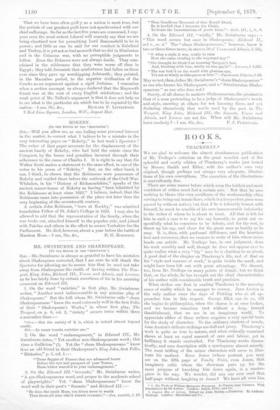MR. SWINBURNE AND SHAKESPEARE. [TO TILE nDITOIC OF T1111 "
SPEOTATOF.,1
Swinburne is always so grateful to have his mistakes about Shakespeare corrected, that I am sure he will thank the
Spectator for allowing me to assure him that he need not take away from Shakespeare the credit of having written The Tem- pest, King John, Richard III., Venus and Adonis, and Lucrece, as he has lately done by certain assertions of his in his amusing comment on Edward III.
1, On the word " rarieties," in that play, My. Swinburne writes, "Another word indiscoverable in any genuine play of Shakespeare." But the folk whom Mr. Swinburne calls "sham Shakespeareans" know the word extremely well in the first Folio of their " Shakespeare's Works," in whose first play, The Tempest, on p. 6, col. 2, "rariety " occurs twice 'within three onsecutive lines :— " Gon.—But the raTioty of it is, which is indeed :almost beyond credit.
Seb.—As many voucht rarieties are."
2. On the word. " endamagement," in Edward III., Mr, Swinburne notes, "Yet another non-Shakespearean word; this time a Gallicism" (1). Yet the " sham Shakespeareans" know it as an old friend in their Shakespeare's King John, first Folio, "Histories," p. 5, col. 1 :— "These flagges of France that are aduancod heore Before the eye and prospect of your Towne, Hane hither maroh'd to your ondamagement."
3. On the Edward III. " invocate," Mr. Swinburne writes, "A pre-Shakespearean word, and proper to the academic school of playwrights." Yet "sham Shakespeareans" know the word well in their poet's " Sonnets " and Richcurd III.:— "Be thou the tenth Muse, ten times more in worth
Then those old nine which rimers invocate."—Son, x/rxyiii,, I. 10. "Thou bloodlesse Remnant of that Royall 13lood, Be it lawfull that I invocato thy Ghost, To hoar° the Lamentations of pooro Anno."—Rich. ii., 8.
9. On the Edward III, " wistly," Mr. Swinburne says :---- "This word .occurs but once in Shakespeare,—Richard act v., sc. 4." The "sham Shakespeareans," however, know it two or three times more; in stanza 58 of Venus and Adonis, 1. 343,
"0 what a sight it was, wistly to view How she came stealing to tho wayward boy !"
"She thought he blush'd as knowing Tarquin's lust,
And, blushing with him, wistly on him gaz'd."—Lucroce, 1. 1,355.
"The sun ]ook'd on the world with glorious eye,
Yet not so wistly as this queen on him."—Passionate Piigrim,l. 53.
May we not, then, define Mr. Swinburne's "sham Shakespearean" as one who knows his Shakespeare, and a" Swinburnian Shake- spearean" as one who does not P Surely, of all shams in matters Shakespearean, tho greatest is
that of a man pretending to be a judge of Shakespeare's words and style, sneering at others for not knowing them, and yet declaring shamelessly that words used by the poet in The Tempest, King John, Richard III., the Sonnets, Venus and Adonis, and Lucrece are not his. When will Mr. Swinburne learn modesty P—I am, Sir, S6c., F. J. FultmvALL,






























 Previous page
Previous page